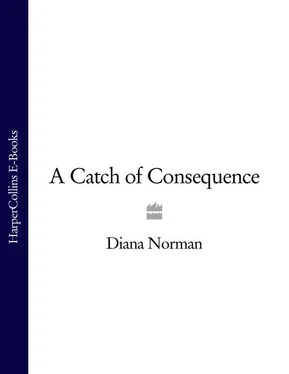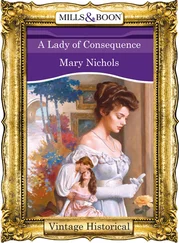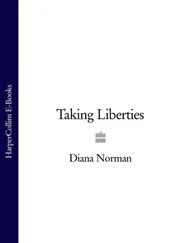‘Makepeace Burke’s picked up a man.’ She could hear the voices now. And, because the Cut was as patriotic as it was respectable, she could also hear the addendum: ‘A Tory man.’
It hadn’t been easy, a woman running a tavern. One of the proudest moments of her life – and the most profitable – had been when, with the imposition of the Stamp Tax, the local lodge of the Sons of Liberty had chosen the Roaring Meg for their secret meetings. Good men most of ’em, like nearly all her customers, but, again like her other regulars, driven to desperation by an unemployment that was the direct result of British government policy.
And among those very Sons was at least one of the group that had thrown the drownder into the harbour. Mighty pleased they’d be to find Makepeace Burke succouring the enemy. An enemy, what’s more, who’d report them to the magistrates quicker’n ninepence.
‘Who done it on us?’ Sugar Bart would ask, as he climbed the gallows’ steps.
‘Makepeace Burke,’ the Watch would reply.
After that, no decent patriot – and all her clientele were patriots – would set foot in the Roaring Meg again.
Oh no, she couldn’t trust the Watch not to give her away; apart from being as big a collection of incompetents as ever let a rogue slip through its fingers, it was hand in glove with the Sons of Liberty. Last night, when Governor Bernard had called on the Watch to drum the alarm, he’d discovered that its men had joined the mob and were happily destroying property with the rest.
The nearer she got to her tavern, the more perturbed Makepeace became. ‘Lord, Lord,’ she prayed out loud, ‘I did my Christian duty and saved this soul; ain’t there to be no reward?’
Like most Boston Puritans, Makepeace had a pragmatic relationship with the Lord, regarding Him as a celestial managing director and herself as a valued worker in His company. Until now she’d found no conflict between Christianity and good business. She obeyed the Commandments, most of ’em, and expected benefits and an eternal pension in return.
And the Lord answered her plea this bright and hot August morning by skimming the last word of it across the surface of His waters until it hit a wharf wall and bounced it back at her in an echo: Reward, reward.
Receiving it, Makepeace became momentarily beautiful because she smiled, a rare thing with her, showing exquisitely white teeth with one crooked canine that emphasized the perfection of the others.
‘You surely can hand it to the Lord,’ she told Tantaquidgeon. ‘He got brains.’
The drownder was in her debt. There was no greater gift than that of life – and she’d just given his back to him. In return, he could reward her with a promise of silence. Least he could do.
She looked down fondly at the richly clad bundle by her feet. ‘And maybe some cash with it,’ she said.
Having settled on a conclusion she’d actually reached at the moment the drownder opened his eyes, she felt better; she was a woman who liked a business motive.
Also she was intrigued – more than that, involved – by the man.
As someone who’d fought for survival all her life, Makepeace was affronted by apathy. Never having accepted defeat herself, this drownder’s ‘Does it matter?’ had excited her contempt but also her curiosity and pity. Look at him: fine boots – well, he’d lost one but the other was excellent leather; gold lacing on his cuffs. A man possessed of money and, therefore, every happiness. So why was he uncaring about his fate?
The boat bumped gently against the Meg’s tottering jetty. Makepeace looked around with a surreptitiousness that would have attracted attention had there been onlookers to see it.
Bending low, she climbed the steps and looked into the tap-room. Nobody there. She went through and opened the front door to peer into the Cut for signs of activity. Nothing again.
She returned to the boat and told Tantaquidgeon all was clear. She threaded her lobster-pots together and dragged them up and through the sea entrance to her tavern with Tantaquidgeon behind her, the tarpaulined Englishman draped over his forearms like laundry.
The Roaring Meg’s kitchen doubled as its surgery, and the cook as its doctor, both skills acquired in the house of a Virginian tobacco planter who, when Betty escaped from it, had posted such a reward for her capture that it was met only by her determination not to be caught.
She might have been – most runaway slaves were – if she hadn’t encountered John L. Burke leaving Virginia with wife, children, Indian and wagon for the north after another of his unsuccessful attempts at farming. John and Temperance Burke had little in common but neither, particularly Temperance, approved of slavery, and they weren’t prepared to hand Betty back to her owner, however big the reward. She’d stayed with the family ever after, even during her late, brief marriage, despite the fact that John Burke’s failures at various enterprises often necessitated her working harder than she would have done in the plantation house.
She examined the body on the kitchen table, deftly turning and prodding. ‘Collarbone broke.’ She enclosed the head in her large, pink-palmed hands, eyes abstracted, her fingers testing it like melon. ‘That Mouse Mackintosh,’ she said, ‘he sure whopped this fella. Lump here big as a love-apple.’
‘I thought maybe we could redd him up a piece, then Tantaquidgeon row him to Castle William after dark,’ Makepeace said, hopefully, ‘Dump him outside, like.’
Betty pointed to a meat cleaver hanging on the wall. ‘You’ve a mind to kill him, use that,’ she said. ‘Quicker.’
‘Oh … oh piss .’ Makepeace ran her hand round her neck to wipe it and discovered for the first time that her cap was hanging from its strap and her hair was loose. Hastily, she bundled both into place. Respectable women kept their hair hidden – especially when it was a non-Puritan red.
Although the kitchen’s high windows faced north, the sun was infiltrating their panes. Steam came from the lobster boilers on a fire that burned permanently in the grate of the kitchen’s brick range, and the back door had to be shut not just, as today, to prevent intruders but to keep out the flies from the privy which, with the hen-house, occupied the sand-salted strip of land that was the Meg’s back yard.
Makepeace went to the door. Young Josh had been posted as lookout. ‘Anybody comes, we’re closed. Hear me?’
‘Yes ’m, Miss ’Peace.’
She bolted the door, as she had bolted the tavern’s other two. Tantaquidgeon was keeping vigil at the front. ‘Git to it, then,’ she said.
They were reluctant to cut away the patient’s coat in order to set his collarbone – it had to be his best; nobody could afford two of that quality – so they stripped him of it, and his shirt, causing him to groan.
‘Lucky he keep faintin’,’ Betty said. She squeezed her eyes shut and ran her fingers along the patient’s shoulder: ‘Ready?’
Makepeace put a rolled cloth between his teeth and then bore down on his arms. Her back ached. ‘Ready.’
There was a jerk and a muffled ‘Aaagh’.
‘Oh, hush up,’ Makepeace told him.
Betty felt the joint. ‘Sweet,’ she said. ‘I’m one sweet sawbones.’
‘Will he do?’
‘Runnin’ a fever. Them Sons give him a mighty larrupin’. Keep findin’ new bruises and we ain’t got his britches off yet.’
‘You can do that upstairs. He’s got to stay, I guess.’
‘Don’t look to me like he’s ready to run off.’
Makepeace sighed. It had been inevitable. ‘Which room?’
Betty grinned. The Meg was a tavern, not an inn, and took no overnight guests. The bedroom she shared with her son was directly across the lane from the window of the house opposite. Aaron’s, too, faced the Cut. The only one overlooking the sea and therefore impregnable to spying eyes was Makepeace’s.
Читать дальше












